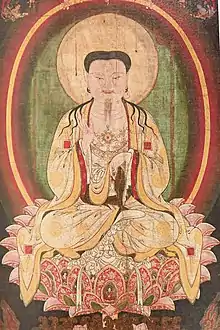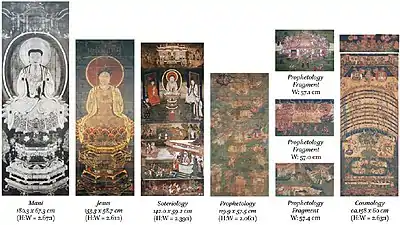| Statue of Mani | |
|---|---|
| Artist | Unknown |
| Year | 14-15th century (late Yuan and early Ming) |
| Type | Silk painting hanging scroll |
| Dimensions | 183.3 cm × 67.5 cm (72.2 in × 26.6 in) |
| Location | Fujita Art Museum, Osaka City |
Icon of Mani (Japanese: マニ像;[1] Icon of Mani) is a silk painting hanging scroll from the Yuan or Ming period, from the coastal area of southern China, depicting Mani. The portrait of the founder Mani has been completely Sinicized.
Discovery process
The black and white photo of this painting was originally published in the 1937 Japanese Oriental Art Periodical "Guo Hua", but did not give the location of the collection and other relevant information. According to the research of Hungarian Asian religious art historian Zsuzsanna Gulácsi, the painting has similar features to the Mani statue depicted in the "Sermon on Mani's Teaching of Salvation". It should be an icon used by Manichae in southern China for religious worship. Originally it was not possible to verify the source, so it is generally believed that it was lost during World War II.[2] However, the documentary linguistics professor Yoshida of Kyoto University discovered the original work of "Icon of Mani" at the Fujita Museum of Art in Osaka, Japan in 2019. Later, the painting was exhibited at the "National Treasure No. Fujita Museum Exhibition" at the Nara National Museum. "On public display.[3]
Gallery
 Details of the main image of the original painting
Details of the main image of the original painting Black and white photos published on "Guo Hua"
Black and white photos published on "Guo Hua".jpg.webp) Details of the main image: the jewel ring worn on the chest, the black square pattern on the white robe
Details of the main image: the jewel ring worn on the chest, the black square pattern on the white robe.jpg.webp) Lianhuatai details: the performance of the mani Lotte, it can be seen that his costume also has the style of Western Regions
Lianhuatai details: the performance of the mani Lotte, it can be seen that his costume also has the style of Western Regions
- Comparison with the "Buddha of Light" statue
The comparison chart made by Zsuzsanna Gulácsi compares the details of the painting with the Mani statue in "Icon of Mani" and the "Buddha of Light" statue of Mani in Cao'an in Quanzhou.
Excursus

Eight silk hanging scrolls with Manichaean didactic images from southern China from between the 12th and the 15th centuries, which can be divided into four categories:
- Two single portraits (depicting Mani and Jesus)
- Icon of Mani
- Manichaean Painting of the Buddha Jesus
- One scroll depicting Salvation Theory (Soteriology)
- Four scrolls depicting Prophetology (Prophetology)
- One scroll depicting Cosmology (Cosmology)
References
- ↑ Toyo Yoshida (2010). "Report III Toyoda Yoshida "The World of Mani Teaching Paintings"". Ryukoku University (in Japanese). pp. 51, 55. Retrieved 2018-12-16.
図14:マニ像(『国华』より)
- ↑ Gulácsi, Zsuzsanna (2015-12-14). Mani's Pictures: The Didactic Images of the Manichaeans from Sasanian Mesopotamia to Uygur Central Asia and Tang-Ming China. BRILL. ISBN 978-90-04-30894-7.
- ↑ マニ教始祖 独尊像 世界で初確認 - 衣服の特徴などから判明 大阪の藤田美術館蔵/奈良博特別展で公開中. 奈良新聞 (in Japanese). 2019-04-14. Retrieved 2020-03-18.
._Seal_with_figure_of_Mani%252C_possibly_3rd_century_CE%252C_possibly_Irak._Cabinet_des_M%C3%A9dailles%252C_Paris.jpg.webp)